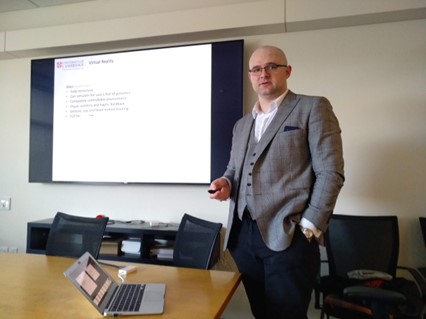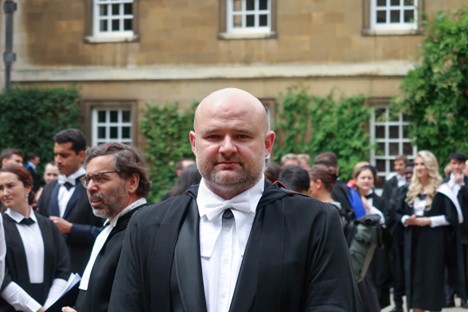Augmented reality, cobots, sunken mines and start-ups
Dr Sławomir Tadeja is helping workers become superhuman for everyday tasks; and his work has been recognised with an Institute for Manufacturing Postdoctoral Award for Excellence.
The postdoctoral research associate at Trinity Hall, is looking at how technology can supercharge workers, allowing them to see information as they work, using augmented reality and even co-work with robots.

Augmented Reality in the workplace
As a Research Associate in the Cyber-Human Lab (CHL), which belongs to the Institute for Manufacturing (IfM) at the Department of Engineering he says his lab is focused on designing and prototyping cyber-physical solutions that can amplify human abilities when working in real-world industrial work environments. “For example, we often design systems to support workers in carrying out complex tasks such as device repair or manual assembly of engineering assets,” he says.
This could mean using “interface technologies”, like augmented reality facilitated with special headsets that allows the worker to see the real world but also overlays of information.
“Such an interface allows for digital artefacts (e.g. textual or visual cues, 3D models, imagery and animation) to be blended with the user’s field of view, providing additional, in-situ information,” says Sławomir.
Rise of the Cobots
Using special gestures, the worker can even interact with the information he adds. One application can allow workers to interact with collaborative robots (aka ‘cobots’).
Sławomir said: “Robots specifically designed to work side-by-side with human operators and workers, can be paired with humans to carry out assembly tasks in a collaborative manner. Here, the robot can be used to pick and place assembly parts, leaving the worker to manually assemble them. In this context, AR-based visualisation can serve as a means for exchanging visual information depicting, for instance, a robot’s intent to move along a given movement trajectory visualised in space.”
Medical Applications
Other application includes medical ones like supporting post-stroke rehabilitation.
Sławomir said: “The thing that interests me the most about my research is its potential for direct application of our results in the real world.
For example, last year, we helped develop a virtual reality (VR) system to showcase sizable medical equipment, such as mobile MRI (magnetic resonance imaging) units, at various events. I helped design the whole system and oversaw its deployment at the largest medical exhibition in the world, which took place in Dubai, UAE.
Despite the success of his research the IfM award came as a surprise to Sławomir: “There are many postdoctoral researchers at my Institute conducting cutting-edge research. It puts me in continuous awe when I have a chance to discuss their discoveries over a friendly coffee. The award itself has boosted my motivation to do even more in the upcoming months and years. I treat it as a distinction not only for my work but also for all my close collaborators in Cyber-Human Lab (CHL) and abroad, all the wonderful, gifted students and scholars I work with, and especially to my supervisor, Dr Thomas Bohné, for supporting me since the very beginning of my joining the lab.”
Inspiration, detecting sunken munitions, and the Large Hadron Collider
Slawomir says he has drawn inspiration from many people but he singled out a few for special mention: “My first mentor was Prof. Dr hab. Paweł Moskal from the Jagiellonian University in Kraków, who was supervising my Master’s thesis. I joined his lab as an undergraduate, and this is where I co-authored my first research papers concerning the detection of hazardous materials underwater, such as chemical munition shells that were sunk in the Baltic Sea after the Second World War.
He also pointed to his work at the Large Hadron Collider and Dr Anne Dabrowski. “She invited me to spend a year as a Technical Student in the Compact Muon Solenoid (CMS) experiment on the Large Hadron Collider (LHC) at CERN.
“Here, I worked on visualising radiation flux data for the CMS experiment’s underground cavern, which developed my interest in multimodal data visualisation and human-machine interfaces.”

Trinity Hall, the MCR and PDRA communities
Being the recipient of a Cambridge European & Trinity Hall Scholarship Sławomir was able to study at Trinity Hall for his doctorate, staring in 2016.
“I really enjoyed my time at Trinity Hall, and I do believe that I am very lucky to be able to join such a vibrant and stimulating community. Having all that in mind, I would reflect that I mostly enjoyed the people I had the privilege to meet, whether the students, Fellows or staff members. That was the reason why I decided to apply to join the PDRA community and continue being part of the College.”
“Since completing my PhD, I have had the opportunity to further develop my research skills at Cambridge by exploring the concept of digital twins under the supervision of a Trinity Hall fellow, namely Dr Jerome Jarrett and Dr Timoleon Kipouros from the Engineering Department.”
Being a part of our wonderful PDRA cohort is a very stimulating experience. I find the MCR community in our College to be a very welcoming and vibrant group of wonderful, smart people. The events organised by the PDRA that I have had a chance to attend in the past years have had a very motivating effect on me; being able to chat about and see what fantastic research other PDRAs are carrying out really motivates oneself to excel in one’s own work.”
Entrepreneurship
Being part of the College has also allowed Sławomir to work on another talent; entrepreneurship. In 2020, he co-founded an Immersive Toolbox startup, where he utilised the knowledge gathered while undertaking his PhD.
“Here, we developed an augmented reality (AR) system for supporting manual assembly with QR-based tagging as well as a cross-platform platform AR application for instruction and repair of heat pumps and other devices.”
Securing seed-funding from Poland he was also a recipient of the Lee-Yung Family Fund for Entrepreneurship at Trinity Hall, the startup was fully acquired in 2022. “Having this opportunity, I would like to thank Dr Rachelle Stretch and Oleno Netto from Trinity Hall’s Alumni & Development team, who oversaw the application process at the time. I would also like to encourage all Trinity Hall members to use this unique opportunity to “taste” entrepreneurship first-hand and join the Trinity Hall Entrepreneurs Network (THEN).”
Find a mentor
And what is the secret of his success? “My advice is to find a mentor who can support your development. I was lucky enough to meet many researchers who were willing to help me grow and sharpen my skillset, often pointing me towards solutions I would not have thought possible.
“I believe there are many people, especially in Cambridge, who would be thrilled to help if you reach out to them and are willing to listen and put down the required work. For instance, I know that Trinity Hall’s PDRA are in the process of organising a mentoring scheme aimed at current postgraduates at the College.”